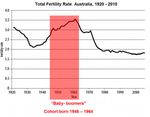The Busselton Baby Boomer Study - Busselton Health Study
←
→
Page content transcription
If your browser does not render page correctly, please read the page content below
What is the Busselton Baby Boomer Study?
The Busselton Baby Boomer Study (BBBS) is a longitudinal study designed to comprehen-
sively characterize chronic disease in a community sample of ‘Baby-
boomers’ (adults born 1946 to 1964) with the goal of assessing all par ci-
pants every 5 years.
The general aim of the BBBS is to characterize mul ple chronic condi ons
(also known as mul -morbidity) and risk and resilience factors, iden fy
pa erns of chronic diseases and relate them to changes over me in cogni-
ve and physical func on, and inves gate rela onships with the outcomes
of quality of life, physical ac vity, work disability and use of health-care
services.
The first phase (baseline) study was conducted between 2010 and 2015 and collected data from 5,107 Baby -
boomers, represen ng a remarkable 76% par cipa on rate in the City of Busselton. Residents were selected
from the electoral roll and completed ques onnaires and up to 4 hours of clinical tes ng involving cogni ve,
cardiac, respiratory and physical func on, ear and eye assessments, body composi on, bone density, sleep stud-
ies and blood samples for biochemistry and gene c research. The BBBS is the most comprehensive survey ever
undertaken by the BPMRI and the most detailed community health study in the Na on. The second phase
(follow-up) study of this cohort is underway and will con nue un l 2021.
Condi ons Cardiovascular Respiratory Disease Mental Health Gastrointes nal Musculoskeletal
studied: Disease & Allergy & Neurological Condi ons Disease Disorders
hypertension, high asthma, chronic obstruc- depression, Alzheimer’s ulcer, colonic polyps, coeli- osteoarthri s, rheumatoid
cholesterol, cardiac ve pulmonary disease, demen a, Parkin- ac disease, reflux disease, arthri s, hip, back, shoul-
pacemaker, heart disease, pneumonia, son’s disease, anxiety disor- hiatus hernia, Crohn’s dis- der and knee pain, osteo-
a ack, transient pleurisy, bronchi s, ders including stress, PTSD, ease, ulcera ve coli s, porosis, sarcopenia, gout,
ischaemic a ack, sinusi s, hay fever, food bipolar disorder, schizophre- irritable bowel syndrome, ankylosing spondyli s,
stroke, angina, claudi- allergies, anaphylaxis nia, epilepsy, ADHD, cogni- diver cular disease, gall- systemic lupus erythemato-
ca on ve func on & memory stones sus
Endocrine Disease Eye & Vision Disorders Ear & Hearing Disorders Sleep Disorders Other condi ons
diabetes (Type I, II or macular degenera on, hearing loss, chronic ear obstruc ve sleep apnoea, cancer, head or neck trau-
gesta onal), metabol- glaucoma, myopia, cata- infec on, nnitus, snoring, narcolepsy, exces- ma, migraine, headache,
ic syndrome, osteo- racts, dry eye syndrome Menieres’s disease, imbal- sive day me somnolence anaemia, cirrhosis of the
porosis, kidney dis- ance, ver go liver, fa y liver, poliomyeli-
ease, thyroid disease s, urinary tract infec on
Risk factors Overweight & obesity - physical inac vity - diet & nutri on - smoking - alcohol use - ancestry, gene cs & family history - educa on -
and associa- marital status - occupa onal history - working environment & sa sfac on - community values & social support - IT use/screen me - sun
ons: exposure - reproduc ve history - sleep quality & dura on - socioeconomic status - and other environmental exposures & factors
Biospecimens Biobank of DNA and RNA for gene c studies - serum & plasma for haematology & biochemistry tests and new biomarker discovery -
for research: throat swabs for microbiome studies inves ga ng novel disease processes
Why are we studying Baby-boomers?
Australia’s popula on is ageing and the transi on of the Baby-boomer gen-
era on from middle to older age is associated with increased mul -
morbidity – a major driver of health costs in Australia. Models of healthcare
must move from a focus on single condi ons to one on mul ple chronic con-
di ons. New knowledge is needed to understand the impact of mul -
morbidity on health and social outcomes, however the pa erns, causes and
impact of mul -morbidity in the popula on is not currently well known. Lon-
gitudinal studies are needed to provide important evidence on how to predict
and, therefore, prevent the incidence and progression of mul -morbidity so as to reduce its impact on cogni ve
and physical func on, improve quality of life and work force par cipa on, and reduce health-care expenditure.
The BBBS represents a powerful and unique medical and popula on health research resource to be er under-
stand mechanisms of disease and to iden fy and develop effec ve and targeted interven ons to prevent or
be er manage diseases associated with ageing. Study par cipants benefit by receiving detailed study results to
guide lifestyle improvements and early detec on of health condi ons.The baseline survey provided contemporary prevalence data on a range of chronic diseases and condi ons.
• Spinal pain, allergy, arthri s and bowel
diseases occur in high prevalence among
Busselton Baby-boomers.
• 1 in 5 par cipants had current symptoms
or a diagnosis, of depression or anxiety.
• The prevalence of most condi ons in-
creased significantly with older age.
The BBBS will document the changing preva-
lence of condi ons over mul ple survey vis-
its.
Nearly 50% of Baby-boomers reported 3 or more long-term chronic health condi ons.
• Around 5% of Baby-boomers reported 7 or
more long-term condi ons, while less than
10% were free of any chronic condi on.
• Some common co-occurring condi ons
included arthri s, spinal pain, depression,
sleep apnoea, bowel diseases, asthma and
chronic obstruc ve lung disease (COPD).
The BBBS will inves gate the impact differ-
ent pa erns of chronic disease have on phys-
ical and cogni ve func on, and other out-
comes.
The prevalence of modifiable risk factors for disease in Busselton is high, similar to other parts of the Na on.
• Baby-boomers who had 4 or more risk fac-
BBBS NHS Comparison:
tors (over one third of the cohort), were 3 Risk Factor Criteria 2015 2015 BBBS vs National Health Survey (NHS)
mes more likely to have diabetes, depres- Obesity BMI > 29.9 kg/m2 30% 34% similar obesity prevalence
sion or osteoporosis, and twice as likely to Overweight BMI >25 - 140/90 mmHg 28% 34% similar high BP
• Obesity and physical inac vity were the Risky Alcohol Intake >2 STD average daily 18% 20% similar excess consumption
biggest contributors to increased risk of Physical Inactivity20,368
The number of differ-
ent people that have
a ended at least one
Over 50 of the main surveys
1966 Years of
surveys 36,686
First survey
commenced Popula on of
Busselton in
6000
2016 Popula on of
Busselton in
1966
10,821 50,072
People have a ended The total number
between 2 and 10 surveys. of main survey
3115 people have a ended a endances
5 surveys or more
Over
6,690
Baby-boomers living
in the City of Bussel-
450
ton in 2010 Research publica ons
produced using
5,107 Busselton Health Study
data
Baby-Boomers
612,840
a ended the Over
2010-2015
survey
25
66,300
Es mated number of sheets
of paper saved by the intro- Interna onal con-
sor a studies of
Tubes of DNA, RNA,
plasma & serum
banked in the 2010-
Over 3000 duc on of online ques on-
naires in the current survey
gene cs
Data variables per of Baby-Boomers!
2015 survey par cipant
Collabora ng partners: With thanks to:
The Community of Busselton and Surrounds
BPMRI Busselton Health Study Centre 18 West Street Busselton - 9754 0548 - e: admin@bpmri.org.au w: bpmri.org.auYou can also read
























































